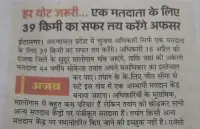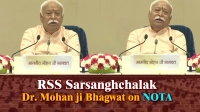
Sympathy with the underdog is natural. But it is a modern fashion to overblow this sympathy into a romanticised image of the underdog, to the point of adulation, aping and even following. Such is the case with Karṇa and occasionally Rāvaṇa (especially in the Eastern and Southern parts of India). This post attempts to restore balance to sympathetic minds by recounting the many flaws in Karṇa’s character, while acknowledging his occasional nobility. Karṇa had learned the skills of a kshatriya, but could not maintain with consistency the nobility and balanced vision that were supposed to guide kshatriyas through their lives.
IMPETUOSITY & IMPROPREITY
The very entry of Karṇa into Mahabhārata reveals this flaw. Drona was holding a closed demonstration of the skills of his pupils. Karṇa entered uninvited. This was unseemly. If his object was to gain admiration for his skills, he could have done so by showing them off. He need not have challenged Arjuna to a duel. This showed impropreity.
Karṇa must have been older to Arjuna by 4-6 years at least, since he was born before Kunti’s marriage and Arjuna was the third son of Kunti after marriage. If Dharmaraja was 16 at the time of the exhibition, Arjuna could not have been more than 14, and Karṇa would have been 18-20 years in age. Thus, his very advent shows a full grown man – Karṇa, challenging a young boy (Arjuna). This was improper and not noble. But Karṇa in the heat of anger would often do what was improper.
Impetuosity is a character flaw that is lethal to kshatriyas in battle. For this reason, Bhīshma rated Karṇa as only half a rathin when the battle with Pandavas was in the offing.
SMALL MINDEDNESS
The small mindedness of Karṇa comes to the fore in another episode. When Duhsashana dragged Draupadi to the court, Vikarṇa argued that a gentlewoman should not be treated in this manner and could not be enslaved. Karṇa not only opposed him, but he induced Kauravas to degrade Draupadi by saying:
“The wife of five husbands is no better than a strumpet. There’s nothing wrong in dragging her to the men’s assembly. She and her husbands are all nothing but slaves now. They do not own even the clothes they are standing in. Strip them of their finery”
Until he spoke, none of the Kauravas had thought of this. There was no reason for Karṇa to intervene in a quarrel between cousins, other than personal jealousy. For this petty emotion, he staked the honour of a woman. This also showed his impetuosity. Under stressful situation, he could forget all humane considerations.
SELF & PRIDE ABOVE FRIENDSHIP
Much is thought about Karṇa’s friendship with and loyalty to Duryodhana. While he himself flaunted this friendship, it did not prevent him from running away from the Gandharvas and hiding in a village while Duryodhana was imprisoned by them. At length, it was the Pandavas who rescued and set Duryodhana free. No wonder when Karṇa asked Bhīshma about the king, he answered bitterly:
“Those loyal to the king don’t live to ask whether the king be alive. How could you think of your own hide with the king in danger? Your much vaunted love of the king is nothing but pretence.”
The overweening pride of Karṇa also often came in the way of his loyalty and duty towards Duryodhana. For one, he withdrew from battle as long as Bhīshma was leading it (although in some versions, this was due to a condition stipulated by Bhīshma). After becoming the general, he forced King Shalya to serve as his charioteer. This was from misplaced pride. Worse, when King Shalya tried to provoke his warlike spirits by taunting him saying, “Don’t boast now, for I know that you shall lose heart on seeing Arjuna” – he responded by insulting the women and people of his kingdom. This injudicious to say the least, since Shalya was driving his chariot.
Again, it was overweening pride that made him change his horses to white, to imitate Arjuna before the crucial battle. And he went through his own army insulting Arjuna while Arjuna was engaging the kauravas in battle. The net result was that by the time he reached Arjuna, the latter had the time to kill Karṇa’s son before his eyes. This must have been demoralising.
It was his pride that made him ignore Shalya’s warning that his nāgastra was aimed too high. As it was, the astra hit Arjuna’s crown. Although it is said that Sri Krishna brought Arjuna’s chariot down by two feet, this seems implausible, since in that case the arrow would have flown over Arjuna’s head. It is more likely that as Shalya had warned, Karṇa was aiming too high. Shalya himself might have warned Karṇa because he must have known that Karṇa, unlike Arjuna and Bhīshma, was not well versed with the finer points of charioteering (in spite of being fostered in a suta family).
It was overweening pride that made Karṇa give away the natural armour that he was born with to Indra. Karṇa used armour in all his battles, and knew that he would need this armour in battle. He fought his battles for Duryodhana, and so loyalty and friendship would demand that he hold on to the natural armour. He did not do so. At best this was misplaced generosity, which came in the way of his duty.
Droṇa also knew this flaw in Karṇa’s character, when he supported Bhīshma’s evaluation by saying:
“Karna is headstrong, shows misplaced kindness, runs away from battle and makes mistakes in judgment. And so I would not give him full marks as a warrior.”
JEALOUSY DROVE OUT HIGHER FEELINGS
Overweening pride and jealousy drove Karṇa into extreme selfishness which often led him to forget his duties to his friend Duryodhana. For instance, when Kunti invited him to rejoin his natural family, he turned down the invitation with an offer to kill none but Arjuna. This offer showed that no higher feelings dominated his mind at the time.
By agreeing not to kill the other brothers, he was hurting Duryodhana’s cause, which required him to fight all the Pandavas. In fact, all the kauravas were killed by Bhīma and not by Arjuna, most frequently by arrows (Bhīma was quite the archer, although not possessed of divine weapons or astras). Thus, the offer showed that he placed his individual dislikes above friendship with Duryodhana.
The offer was not prompted by love for his natural mother Kunti or her sons either. He had no pity for Kunti who was his unwed mother, as his bitter words showed. His offer to fight Arjuna alone was prompted by his pride, since he thought Arjuna alone was fit to fight him. This showed a misplaced contempt for the other brothers, especially for the formidable Bhīma who singlehandedly brought down all the children of Gāndhāri.
BAD JUDGEMENT
His bad judgement came to the fore at the fatal moment when his chariot wheel sank into the blood soaked soil of Kurukshetra. Chariots were breaking down, horses were getting killed every day. We often read of warriors transferring to a different chariot. Karṇa being the general of Kaurava army could easily have done so. For some strange reason, he chose to get down and lift the wheel out of the rut. Possibly he was confused by having seen his son killed before his eyes, and missing Arjuna with his divine astra. He compounded his difficulties by speaking of ‘dharma’ of battle to Arjuna. This gave the cue to Shri Krishna who reminded Arjuna that Karṇa had no right to claim the protection of dharma after having killed Abhimanyu on foot and inciting the disrobing of Draupadi. Arjuna who might have hesitated otherwise, was precipitated into ending Karṇa’s life.
OCCASIONAL NOBILITY
For all his flaws, Karṇa was not without his moments of nobility and greatness. The fortitude with which he bore the pain of an insect boring through his thigh to avoid waking his guru is one such instance. His best moment came when Shri Krishna revealed the secret of his birth to him, and asked him to rejoin his brothers. As Irawati Karwe so well puts it:
“By accepting Krishna’s offer, he would have become at once a Kshatriya of the highest rank, and a king. The Pandavas, his hated rivals, would have waited on him as their eldest. All this he gave up, and easily, without saying one harsh word to Krishna.
He said, “What you ask is impossible. My whole life has been spent among the sutas. Myself and my sons have married among them. I cannot now break away from them. Any kingdom that I win I would present to Duryodhana. Do not try to persuade me.” “So be it,” said Krishna and turned away.
This shows Karna to be a noble person, a true friend, a man tied to his foster family by love and duty, an incorruptible vassal. By spurning for the sake of his friend what he had coveted always, he reached moral grandeur.”
A TRAGIC AND TRUNCATED HERO
Unfortunately, he did not continue to dwell in the heights that this moment of self-revelation and clarity scaled. Very soon he reverted to the pettiness with Shalya, and forgot his love for Duryodhana in his jealousy for Arjuna as the episode with Kunti reveals.
All in all, Karṇa can only be described as a tragic and truncated hero. His life is a story of what might have been.
– By Dr.Rahul Shastri,
Based on and inspired by Yugānta: The End of an Epoch, Irawati Karwe, 1968, Poona





Leave a comment